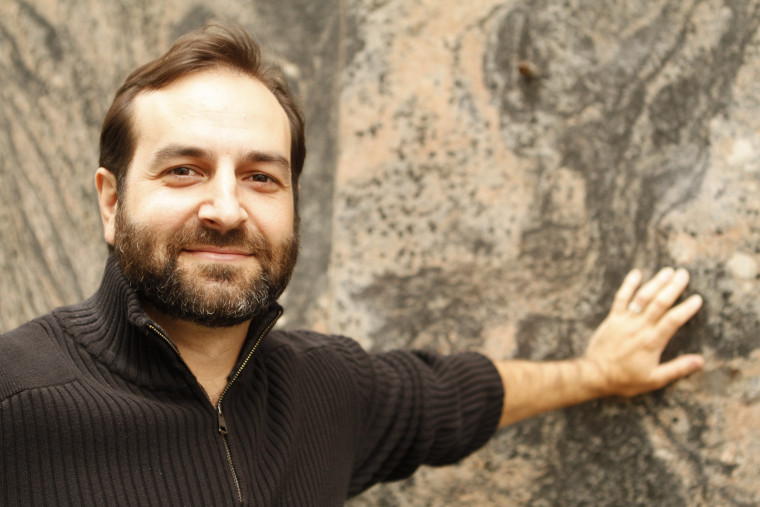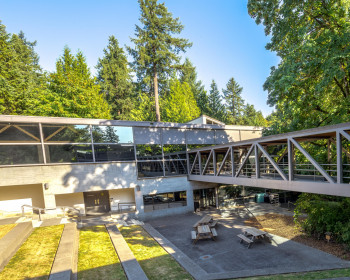LC Law alums, George Kimbrell and others, fighting for food safety and the environment.
Four Lewis & Clark Law alums are engaged in legal battles related to food safety - for humans, animals, and the environment - through their work at the Center for Food Safety (CFS), a nationwide nonprofit whose mission is to empower people, support farmers, and protect the earth from the harmful impacts of industrial agriculture. CFS has won several important cases recently, thanks to the hard work of these alums.
Open gallery

Four Lewis & Clark Law alums are engaged in legal battles related to food safety - for humans, animals, and the environment - through their work at the Center for Food Safety (CFS), a nationwide nonprofit whose mission is to empower people, support farmers, and protect the earth from the harmful impacts of industrial agriculture. CFS has won several important cases recently, thanks to the hard work of these alums:
George Kimbrell (JD ’04) is CFS’s Legal Director, overseeing all of CFS’s legal work as well as serving as counsel in many CFS cases. His docket runs the gamut of CFS program areas, including pesticides, pollinators, genetically engineered organisms, animal factory pollution, food labeling, foodborne illness, organic standards, and aquaculture. Among other landmark cases, Kimbrell was counsel in the first U.S. Supreme Court case on the regulation of genetically engineered crops. Since 2010 he has taught food and agriculture law as an adjunct professor at Lewis & Clark.
Amy van Saun (JD ’11) is a CFS Senior Attorney who, since 2015, has defended farmers, communities, and the environment from industrial animal factories, aquaculture, genetically engineered crops and animals, and the overuse of toxic pesticides, especially in the Pacific Northwest. She also works to protect the integrity of organic food standards and ensure meaningful food labeling.
Ryan Talbott (JD ’12) joined CFS in 2018 as a Staff Attorney. His docket includes closing food safety loopholes, preventing foodborne illness, regulating slaughterhouses, and addressing the health impacts of toxic pesticides on farmers and farmworkers.
Audrey Leonard (JD ’20) is a CFS Legal Fellow. During law school, Leonard worked for Lewis & Clark’s Earthrise Law Center and was an active volunteer with the Northwest Environmental Defense Center while also serving as the Editor in Chief of Lewis & Clark’s Environmental Law review.
In the last year, CFS’s legal team won several precedent setting cases:
Pesticides
From 2016-2020, CFS, on behalf of conservationists and farmer clients, fought against pesticide manufacturers (Monsanto-Bayer, Dow, Dupont), and the Trump administration in litigation challenging the approval of dicamba pesticides. The approval greenlit a new use of the volatile pesticide for the first time: in-season spraying over-the-top of cotton and soy crops genetically engineered with immunity to the pesticide. In June 2020, the U.S. Court of Appeals for the Ninth Circuit ruled that the pesticide approval violated federal pesticide law (FIFRA) six separate ways, including failing to analyze the adverse impacts to other farmers and their crops from off-field dicamba drift, damaging millions of acres. Citing the “enormous and unprecedented damage” caused by dicamba in the last few years, the Court revoked the registrations.
Berkeley Law’s Legal Planet included both the dicamba decision, as well as another CFS-counseled pesticide case decided in July 2020, in its top ten environmental Ninth Circuit decisions of 2020.
Ocean Aquaculture
Since 2015, CFS has represented a coalition of conservationists and fishermen challenging Department of Commerce regulations that would have, for the first time, permitted netpen aquaculture operations in U.S. federal waters (the area 3-200 miles off U.S. shores). The initial rules only covered the Gulf of Mexico but were the test case for the same proposal in all federal waters. In August 2020, the U.S. Court of Appeals for the Fifth Circuit affirmed a 2018 federal district court decision in the plaintiffs’ favor, holding the aquaculture regulations ultra vires to the Magnuson-Stevens Act and throwing them out absent Congress passing new authority.
CFS also won another aquaculture case in June 2020, this one on the harmful environmental impacts of shellfish aquaculture on Washington state coastlines. In that case, currently on appeal, the U.S. District Court for the Western District of Washington held that the U.S. Army Corps of Engineers’ permitting of industrial shellfish aquaculture in the state of Washington violated both the Clean Water Act and National Environmental Policy Act and vacated the permits.
Genetically Engineered Animals
In November 2020, CFS scored another milestone victory when the U.S. District Court for the Northern District of California agreed with its arguments in a long-running case challenging the federal approval of the first-ever genetically engineered animal for food, a genetically engineered (GE) salmon. The court ruled that the GE salmon approval violated the National Environmental Policy Act and the Endangered Species Act. It also ruled that the defendant agency had to assure the environmental safety of any future GE animals. In the case, CFS represented conservationists, fishing organizations, and the Quinault Nation.
For more on genetically engineered animals, in particular the GE salmon and its connection to industrial agriculture and the future of our food, see this law review article Kimbrell wrote for Lewis & Clark’s Animal Law Review: https://www.animallaw.info/sites/default/files/lralvol18_1_p75.pdf
Lewis & Clark Law Professor Michael Blumm noted the importance of the recent CFS litigation: “It’s always great to see former students succeed in creating a better environment for us all. No one has met with more success than George and his team of Lewis & Clark alums at CFS. They’re on the cutting edge of food law and the environment and are making a real difference in people’s lives.”
Kimbrell recently reflected on the work of CFS: “As litigators working on behalf of the public interest our goal is to both ‘stop the bleeding’ and ‘shift the consciousness’ when it comes to the industrial food system. Legal recognition of societal harms is the first step toward marshalling meaningful change. Our message is simple: We have a choice for the future of our food and we aim to fight for it. In that way we are the lawyers for the food movement. But more fundamentally, these cases reflect the growth and prominence of modern food & agriculture law as an important tributary of environmental and administrative law in the last decade. I’m proud to say that CFS - and Lewis & Clark - have played a role in the advancement of the law into the 21st century in this area.”
Lewis & Clark’s Environmental Law program is organizing a symposium, Food for Thought: The Impact of Food Choices in a Changing Climate, Saturday, March 13, 2021 (virtual), with the help of Kimbrell, which will focus on cutting-edge law and policy issues relating to agriculture, energy, and climate change. During the symposium Kimbrell will discuss his forthcoming paper for the Environmental Law review: Will Regulators Catch the Drift? NFFC v. EPA and Breathing New Life into Pesticide Regulation. For more information about the symposium please visit our website.
More Environmental, Natural Resources, & Energy Law Stories
Environmental, Natural Resources, and Energy Law is located in Wood Hall on the Law Campus.
MSC: 51
email elaw@lclark.edu
voice 503-768-6649
Environmental, Natural Resources, and Energy Law
Lewis & Clark Law School
10101 S. Terwilliger Boulevard MSC 51
Portland OR 97219

